

! FINAL Media Lit Prac Guide WEB 112720. Where Do We Get Our News and Why Does It Matter? Last updated January 08, 2020 We live in a time when it can be difficult to identify reliable news sources.
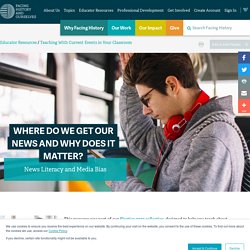
Though the term “fake news” is often used as a political weapon, the problem of stories that are reliant on sloppy journalism, intentionally misleading, or fabricated, is real. Even reliable news sources can have political perspectives that affect their coverage of the news. Across the world, people increasingly turn to social media to learn about key current events, which can make it even more difficult to determine the reliability or perspective of a news story.
Information Overload Helps Fake News Spread, and Social Media Knows It. Consider Andy, who is worried about contracting COVID-19.
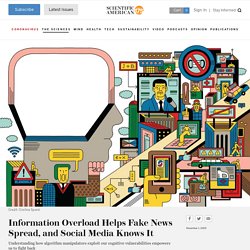
Unable to read all the articles he sees on it, he relies on trusted friends for tips. When one opines on Facebook that pandemic fears are overblown, Andy dismisses the idea at first. But then the hotel where he works closes its doors, and with his job at risk, Andy starts wondering how serious the threat from the new virus really is. No one he knows has died, after all. A colleague posts an article about the COVID “scare” having been created by Big Pharma in collusion with corrupt politicians, which jibes with Andy's distrust of government. Global Media and Information Literacy Week. Skip to main content Social Media Global Media and Information Literacy Week 23October.
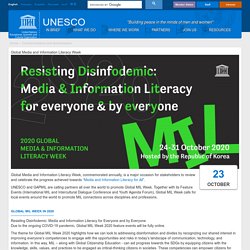
Open access, peer-reviewed scholarly and professional journal of the National Association for Media Literacy Education. Namle – National Association for Media Literacy Education. High School – U.S. Media Literacy Week. The Fake News Problem - Fake News and Media Literacy - Research Guides at Santa Fe Community College.
While not a new phenomenon, the proliferation of fake news has gained dangerous traction in recent years, particularly in the arena of social media platforms such as Twitter and Facebook.
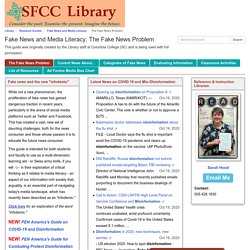
This has created a vast, new set of daunting challenges, both for the news consumer and those whose passion it is to educate the future news consumer. Photography and Visual Literacy - Media Literacy Clearinghouse. See also: Help Students Close Read Iconic Images KEY QUOTE:“Most of us are bombarded by persuasive imagery while not exactly schooled in visual literacy a lot of this messaging skips right past the messaging filter and goes directly into our heads.”
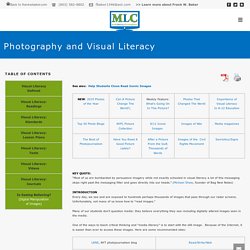
(Michael Shaw, founder of Bag New Notes) INTRODUCTIONEvery day, we see and are exposed to hundreds perhaps thousands of images that pass through our radar screens. Unfortunately, not many of us know how to “read images.” Media Literacy Clearinghouse. Visualizing the Trump Presidency - Google Jamboard. Donald Trump Magazines- Illustration - Media Literacy Clearinghouse.
U.S. Media Literacy Week. Is it Time to Drop ‘Finding the Main Idea’ and Teach Reading in a New Way? Early in the school year at John Ruhrah Elementary and Middle School, co-teachers Darene Parry and Megan Healy were already diving deep into a lesson about the human heart, showing their fourth graders detailed anatomical diagrams and introducing vocabulary like cardio and circulatory.
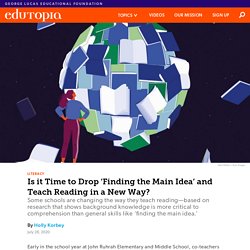
Surprisingly, the unit on “having a good heart”—rich in scientific dialogue and writing practice—is not part of science class, but English language arts (ELA). “Students see the connections between what we are learning in ELA and other subjects,” said Parry of the interdisciplinary curriculum at their school in Baltimore, Maryland, where classes often cover similar topics through different lenses and where the majority of students are English language learners. “They frequently bring up background knowledge that they’ve learned in other classes, and I don’t think they question why we are also learning these topics in ELA.” Leveling the Playing Field How Does the Brain Make Sense of What It Reads?
National Association for Media Literacy Education. Media contact: Kristi Avram press@namle.net Leading U.S.
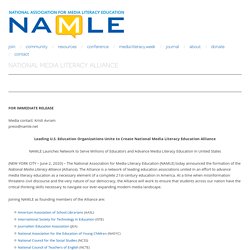
Education Organizations Unite to Create National Media Literacy Education Alliance NAMLE Launches Network to Serve Millions of Educators and Advance Media Literacy Education in United States (NEW YORK CITY – June 2, 2020) – The National Association for Media Literacy Education (NAMLE) today announced the formation of the National Media Literacy Alliance (Alliance). The Alliance is a network of leading education associations united in an effort to advance media literacy education as a necessary element of a complete 21st-century education in America.
Joining NAMLE as founding members of the Alliance are: “Forming the Alliance has been a long-term goal for NAMLE. Alliance members serve millions of educators across the United States and will work collectively to: A Deep Dive into Deep Fakes Media Literacy in a World Where Seeing Is no Longer Believing School Library Journal. News Literacy Must Include Social Emotional Learning School Library Journal. Get Smart About Memes School Library Journal. On Tech: Take YouTube’s Dangers Seriously. Mind Over Media. It's Time To Go Mobile While Teaching News Literacy. Best News Websites for Students. Information Literacy. Media Literacy. 16 Hilarious Memes About the Importance of Grammar and Punctuation. – The Language Nerds. National Association for Media Literacy Education. Empowerment through Education.
Can You Tell Fake News From Real? Study Finds Students Have 'Dismaying' Inability. Stanford researchers assessed students from middle school to college and found they struggled to distinguish ads from articles, neutral sources from biased ones and fake accounts from real ones.
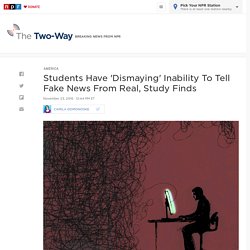
Gary Waters/Ikon Images/Getty Images hide caption toggle caption Gary Waters/Ikon Images/Getty Images Stanford researchers assessed students from middle school to college and found they struggled to distinguish ads from articles, neutral sources from biased ones and fake accounts from real ones. If the children are the future, the future might be very ill-informed. That's one implication of a new study from Stanford researchers that evaluated students' ability to assess information sources and described the results as "dismaying," "bleak" and "[a] threat to democracy. " As content creators and social media platforms grapple with the fake news crisis, the study highlights the other side of the equation: What it looks like when readers are duped. "The photograph had no attribution. Media Literacy at Your Library. This is Why Media Literacy Matters in a Transforming World. Media literacy has become a more important consideration in our children’s futures than ever.
It behooves educators to be familiar with media’s role in our changing world. Media is here to stay as a main component of how society shares information across a vast population quickly. While some teachers fear it, others are realizing the potential to reach more students through things that our digital natives are familiar with. When importance is given to finding and harnessing ways that students learn best, the modern teacher benefits as much as students. At the same time we must be addressing citizenship within the digital community.
Twitter, Facebook, and various news sites keep us up to date in real time. Media literacy helps us take vast amounts of data and compile them into immediately understood presentations. With these points to keep in mind, let’s examine how Media Fluency can make sense of the waterfall of images, videos, and text in the digital world. Teaching Global Digital Citizenship? Use These 10 Essential Questions. Teaching Global Digital Citizenship is all about asking the right questions.
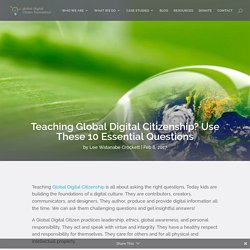
Today kids are building the foundations of a digital culture. They are contributors, creators, communicators, and designers. They author, produce and provide digital information all the time. We can ask them challenging questions and get insightful answers! A Global Digital Citizen practices leadership, ethics, global awareness, and personal responsibility. Free Technology Curriculum from Google - Applied Digital Skills. Free Technology Curriculum from Google - Applied Digital Skills.
Google Applied Digital Skills Review for Teachers. The Google Applied Digital Skills curriculum is great for teachers updating an old-school computer skills class.
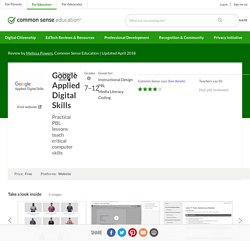
With an emphasis on creativity, collaboration, and personal interests, this ISTE-aligned curriculum really focuses on modern technology skills. In recent years, digital citizenship and coding skills have gotten a lot of airplay, and for good reason, but often at the expense of some other critical tech skills. Google Applied Digital Skills strives to address college- and career-ready skills, plus life skills like planning a vacation, hosting an event, and making a budget. The pace may be a little fast for some learners, though students can repeat modules, or teachers can develop extension activities. The video tutorials are simple but well-made, and they're hosted by a diverse group of personable instructors. Web Literacy Education for Educators. Web Literacy Education for Educators. 12EssentialSkills. Digital Literacy.
Digital Literacy Vocabulary. Speaking of Digital Literacy… 7 resources for much-needed information literacy skills. Fake information is everywhere online. After all, everyone has a Facebook friend who elicits eye rolls when he or she shares a sensational news article that is fake or from a heavily-biased site promoting an agenda. But can today’s students tell the difference between what is legitimate and what is false? The answer might surprise you. Assignment: Media Literacy. Teaching Resources. Information Literacy. Access and Evaluate Information Access information efficiently (time) and effectively (sources)Evaluate information critically and competentlyUse and Manage InformationUse information accurately and creatively for the issue or problem at handManage the flow of information from a wide variety of sourcesApply a fundamental understanding of the ethical/legal issues surrounding the access and use of information Additional resources: 1.
Digital Literacy in the Library. Center for Media Literacy. Free Fiction & Nonfiction Literacy Resources, Curriculum, & Assessment Materials for Middle & High School English Language Arts. Balanced news, issues and opinions, media bias ratings, political news.
False, Misleading, Clickbait-y, and Satirical “News” Sources. 11 Essential Digital Literacy Skills. Home. Portfolio - Hive Chicago. Portfolio - Hive NYC. Portfolio - Hive Kansas City. The Hive KC Portfolio shows the range of projects we’ve funded with innovation funds from the Gigabit Fund and the Hive Drive Fund, along with a pipeline of active proposals we are actively engaging for support with local funders of the Hive KC Digital Drive Fund. These grantees are some of Hive KC’s most active and committed contributors. Their projects reflect exemplar collaborations within our community, showcasing connected learning and next generation Ed Tech experiences and digital literacy programs and pilots. Hive KC supports a competitive grant making process aimed at providing a platform for Hive practitioners to explore the innovative solutions and imaginative next-generation approaches to learning that lie at the heart of Hive’s goals to create impact and learning outcomes in Kansas City and beyond.
Gigabit Fund projects Hive Drive projects KC Women in Technology’s Tech sHeroes. Hive Learning Network Pittsburgh. Web Literacy - Mozilla Learning. Teaching Activities - Mozilla Learning.